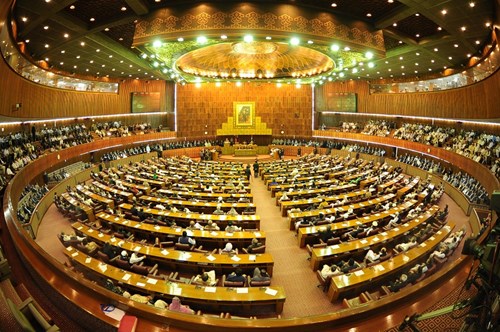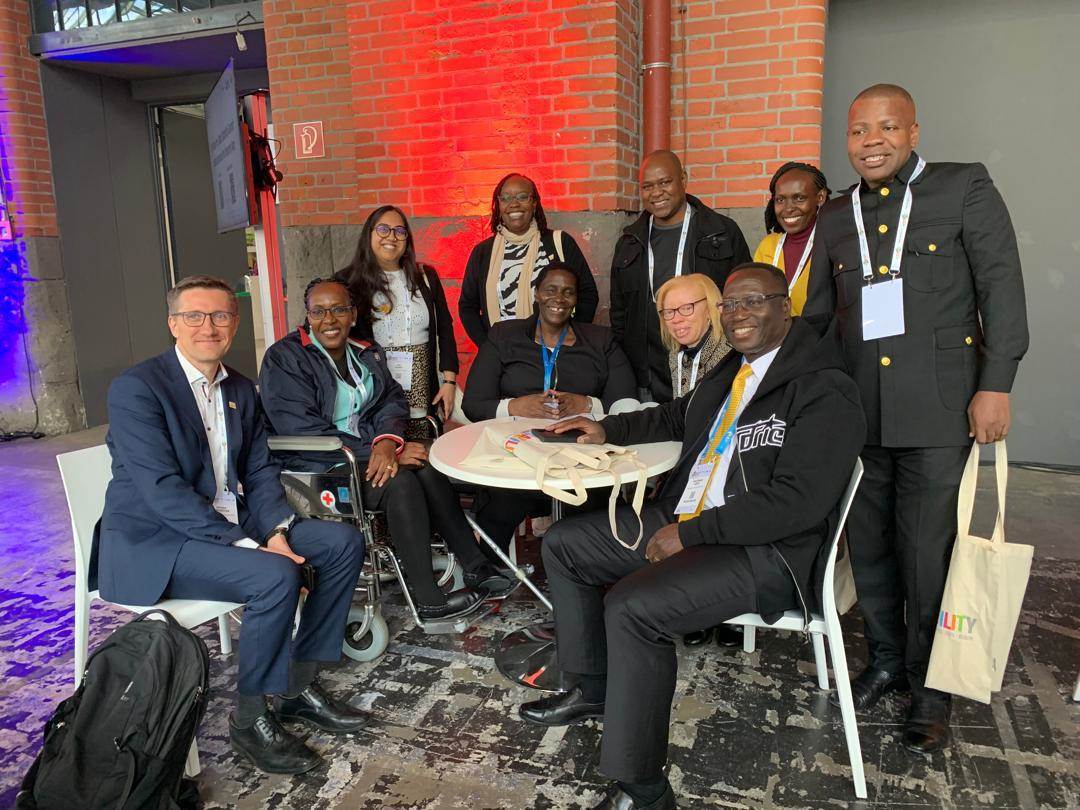
Pakistan: Removing a President
Above: President Pervez Musharraf of Pakistan, 2005.
This CPA blog was published in April 2025 and was written by Samuel Sallybanks during his internship with the CPA Headquarters Secretariat between January and April 2025. It is part of a series on democratic progression in the Commonwealth, which you can find here.
The views expressed in this blog are provided by the author and do not reflect the view of the wider CPA membership.
Today, Pakistan is an active member of the Commonwealth and participates in many CPA activities. However, this has not always been the case.
According to the CPA archives, Pakistan has been suspended from the Commonwealth on two occasions, once between 1999 and 2004, and three years later from 2007 to 2008, both instigated by the actions of General Pervez Musharraf.
Pakistan is no stranger to military rule – in its 78-year-existence, the military has taken power on five occasions. Their power to act is upheld by the ‘doctrine of necessity’ which allows the removal of governments at will.[i]
On 12 March 1999, General Pervez Musharraf, then Army Chief of Staff, was sacked by Pakistan’s Prime Minister, Nawaz Sharif. In response, Musharraf seized power in a bloodless coup.[ii] Seven months later, Commonwealth Ministerial Action Group (CMAG) suspended Pakistan from the Commonwealth.
The work of the Commonwealth Parliamentary Association was unfortunately hindered by Pakistan’s suspension from the Commonwealth. Pakistan had been due to host the inaugural CPA Asia and South-East Asia Regional Conference in November 1999, but this was prevented by Musharraf’s rule.
As a result, CPA delegates gathered in Kolkata instead.[iii] Subsequently, Pakistan’s four Provincial Assemblies were placed in abeyance through Article 5 of the CPA Constitution.
At the 48th Commonwealth Parliamentary Conference in Namibia in 2002, delegates were informed that Pakistan was due to hold elections in October of that year.[iv]
Subsequently, Pakistan’s suspension was removed by Commonwealth Ministerial Action Group (CMAG) at their London Conference.[v] However, this decision was not without controversy.
Several African nations voiced their opposition to Pakistan’s return, seeing it as reward for participation in the ‘War on Terror’, and considering this claimed that Zimbabwe had been unfairly treated.[vi] Despite this, it was hoped that re-entry to the Commonwealth would foster democratic rule once again in Pakistan.
Early signs were positive. Representatives of both Pakistan’s national and provincial government attended the 50th Commonwealth Parliamentary Conference in Ontario, Canada in 2004.

Above: The National Assembly of Pakistan (CPA Archival Photograph).
According to the reports from the Conference published in The Parliamentarian, CPA delegates also discussed whether India should become a separate CPA Region and agreed that Islamabad would hold a parliamentary seminar in 2005.[vii]
Present at the 2005 CPA seminar was the CPA Treasurer, Mrs Cheryl Gillian, MP (United Kingdom) and the Secretary-General of the Indian Lok Sabha, Shri G.C Malhotra, alongside representatives from Sri Lanka, the World Bank Institute and the International Foundation for Election Systems.
From Pakistan, 18 Senators were present (including seven women Senators) who attended every session. Topics discussed included: the development of the CPA and Commonwealth, Women in Parliament, and the role of the Opposition.[viii] With the hosting of this seminar, it appeared that Pakistan’s democracy was progressing.
However, despite this democratic progress, Pakistan was once again suspended in 2007, as Musharraf imposed a state of emergency.[ix]
Senator Ilyas Ahmed Bilour (Awami National Party) criticised Musharraf’s style of governance in an article in The Parliamentarian bringing the situation to the attention of the CPA’s membership. Bilour drew attention to the methods in which scrutiny was pushed aside. This included the 17th Amendment, which made a semi-presidential form of government, and Article 55 which permitted the suspension of both parliamentary chambers so long as less than a quarter of Members were present.
In this way, the now President Musharraf successfully made Parliament into a “rubberstamp assembly”.[x]
However, following mounting public pressure, Musharraf ended the emergency and gave way to elections in February 2008. The result saw Musharraf ousted as President with a multi-party Cabinet elected, led by Asid Ali Zardadi of the Pakistani People’s Party (PPP).[xi] As such, Pakistan’s suspension from the Commonwealth was removed in 2008.[xii]
In government, the PPP passed the 18th Amendment that limited presidential powers and increased legislative checks. Dr Fehmida Mirza, notably the first female Speaker of the National Assembly of Pakistan and in the wider Muslim world, highlighted the importance of the 18th Amendment in an article published in The Parliamentarian.
Having been consulted by all national and tribal parties, with 91 amendments and 77 meetings held, the 18th Amendment passed in March 2010. Its provisions included: the removal of Presidential powers to dismiss and circumvent Parliament, a ban on Executive influence into judicial appointments, and mandatory consultation between outgoing Prime Ministers and the Opposition.[xiii]
These changes ushered in a new era of optimism strengthening Pakistan’s democratic progress.
Pakistan has not been suspended again since returning to the Commonwealth in 2008. The removal of the ‘troublesome’ General Pervez Musharrafwas seen by many as leading to the strengthening of democracy, supported by the Commonwealth and the CPA.
References:
[i] Leslie, Wolf-Phillips. ‘Constitutional Legitimacy: A Study of the Doctrine of Necessity’, Third World Quarterly, 1(4), (1979) 97–133. http://www.jstor.org/stable/3990400
[ii] Ingram, 2000, 311-355
[iii] CPA Annual Report, 2000
[iv] CPA Annual Report, 2002
[v] Ingram, 2002, P.142
[vi] https://www.theguardian.com/world/2004/may/23/pakistan.jasonburke
[vii] CPA Annual Report, 2004
[viii] CPA Annual Report, 2005
[ix] https://www.ft.com/content/d5f78b10-994c-11dc-bb45-0000779fd2ac
[x] Sen. Ilyas Ahmed Bilour, ‘Parliamentary and political problems in Pakistan’s return to democracy’, The Parliamentarian, Issue Three (2007) P.206-208
[xi] Owen Gruenbaum, Commonwealth Update, The Round Table, Vol.97 (June 2008) No. 396, 241-354
[xii] Shaikh Aziz, ‘A Leaf from History: Pakistan’s chequered association with the Commonwealth’ (2017) https://www.dawn.com/news/1305768#:~:text=On%20May%2012%2C%202008%2C%20the%20Commonwealth%20restored%20Pakistan%E2%80%99s,it%20slipped%20into%20emergency%20rule%20late%20last%20year.
[xiii] Dr Fehmida Mirza, MNA, ‘A Milestone in Pakistan’s Parliamentary Development’, The Parliamentarian, Issue One, (2011) P.14-17



